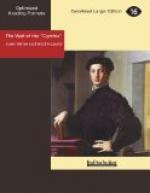“The poorest child in the streets, the most miserable peasant, knew at least what his country was, and to what branch of the great human family he belonged,” he would sometimes say to himself, as he thought of those things. “But I am ignorant of all this. I am cast on the globe like a waif, like a grain of dust tossed by the winds, and nobody knows where I came from. I have no tradition—no past. The spot where my mother was born, and where her ashes now rest, is perhaps profaned and trodden under foot, and I am powerless to defend and protect it.”
These thoughts saddened Erik. Sometimes he would tell himself that he had a mother in Dame Katrina, and a home at Mr. Hersebom’s, and that Noroe was his country. He vowed that he would repay their kindness to him fourfold, and would always be a devoted son to Norway, but still he felt himself in an exceptional position.
Sometimes when he caught a glimpse of himself in a mirror, he could observe the physical difference between himself and those surrounding him. The color of his eyes and his skin often occasioned him gloomy reflections. Sometimes he would ask himself which country he would prefer to be a native of if he had a choice, and he studied history and geography that he might become better acquainted with the civilization of different countries, and with the habits of their inhabitants. It was a sort of consolation to him to believe that he belonged to the Celtic race, and he sought in books a confirmation of the theory of the doctor.
But when the learned man repeated that in his opinion he was certainly Irish, Erik felt depressed. Why among all the Celtic race should he belong to the people who were the most oppressed? If he had felt absolutely sure of this, he would have loved this unfortunate country. But all proof being wanting, why might he not rather believe that he was French? There were certainly Celts in France, and it was a country that he would have been proud to claim as his own, with her glorious traditions, her dramatic history, and her fruitful principles, which she had disseminated all over the world. Oh! he could have passionately loved, and served with devotion, such a country. He would have felt a filial interest in studying her glorious annals, in reading the works of her great authors, and in studying her poets. But alas! all these delicate emotions were denied him, and he felt that the problem of his origin would never be solved, since after so many years spent in making inquiries they had learned nothing.
However, it seemed to Erik that if he could pursue these inquiries himself, and follow up the information already obtained, that he might discover something which might lead to some result, and his activity and zeal might succeed where money had failed. Would he not work with an ardor which must overcome all difficulties?
This idea took possession of his mind, and insensibly had a marked effect in his studies, giving them a special direction; although he was not aware of this fact himself. As he had made up his mind to travel, he commenced to study cosmography and nautical matters; in fact, everything that was taught in the school for marines.




